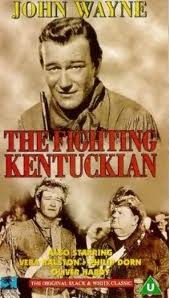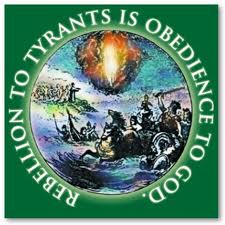 In God We Trust, Pass Me The AmmunitionIn the Election of 1844 the country was evenly divided into two political parties—the Whigs and the Democrats. Henry Clay was the candidate of the Whigs, and James Polk was the candidate of the Democrats. James Polk was elected with 50% of the vote verses Clay's 48%. The big political issues of the day were slavery and tariffs.
In God We Trust, Pass Me The AmmunitionIn the Election of 1844 the country was evenly divided into two political parties—the Whigs and the Democrats. Henry Clay was the candidate of the Whigs, and James Polk was the candidate of the Democrats. James Polk was elected with 50% of the vote verses Clay's 48%. The big political issues of the day were slavery and tariffs.
Polk was a believer in Manifest Destiny. Here is the first use of the term:
In 1845, he (John L. O'Sullivan) published a piece entitled Annexation in the Democratic Review, in which he urged the U.S. to annex the Republic of Texas, not only because Texas desired this, but because it was "our manifest destiny to overspread the continent allotted by Providence for the free development of our yearly multiplying millions".
How could America have gone against the will of God? Yet the war did not go unopposed.
Whig politicians, including David Wilmot, Abraham Lincoln and John Quincy Adams contended that the Texas Annexation and the Mexican Cession enhanced the pro-slavery factions of the United States. Unsatisfactory conditions pertaining to the status of slavery in the territories acquired during the Polk administration led to the Compromise of 1850, one of the primary factors in the establishment of the Republican Party and later the beginning of the American Civil War
How did the powers that be encourage a war with Mexico?
John Stockwell, former CIA agent, summed it up this way:
“they offered two dollars-a-head to every soldier who would enlist. They didn't get enough takers, so they offered a hundred acres to anyone who would be a veteran of that war. They still didn't get enough takers, so [General] Zachary Taylor was sent down to parade up and down the border -- the disputed border -- until the Mexicans fired on him.... And the nation rose up, and we fought the war.” John Stockwell, “The CIA and the Gulf War,” Speech, Santa Cruz, CA, Feb.20, 1991, aired by John DiNardo, Pacifica Radio.
The independence of Texas was never recognized by Mexico. There was also the issue of conflicting claims as to where the boundaries were, as Stockwell mentioned. Wikipedia provides us with the details about the conflict over this strip of land north of the Rio Grande but south of the Nueces:
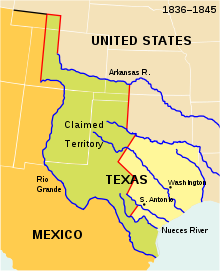 President Polk ordered General Taylor and his forces south to the Rio Grande, entering the territory that Mexicans disputed. Mexico laid claim to the Nueces River—about 150 mi (240 km) north of the Rio Grande—as its border with Texas; the U.S. claimed it was the Rio Grande, citing the 1836 Treaties of Velasco. Mexico, however, under the leadership of General Lorenzo Chlamon, rejected the treaties and refused to negotiate; it claimed all of Texas. Taylor ignored Mexican demands to withdraw to the Nueces. He constructed a makeshift fort (later known as Fort Brown/Fort Texas) on the banks of the Rio Grande opposite the city of Matamoros, Tamaulipas. Mexican forces under General Mariano Arista prepared for war. On April 25, 1846, a 2,000-strong Mexican cavalry detachment attacked a 70-man U.S. patrol that had been sent into the contested territory north of the Rio Grande and south of the Nueces River. The Mexican cavalry routed the patrol, killing 16 U.S. soldiers in what later became known as the Thornton Affair, after Captain Thornton, who was in command.
President Polk ordered General Taylor and his forces south to the Rio Grande, entering the territory that Mexicans disputed. Mexico laid claim to the Nueces River—about 150 mi (240 km) north of the Rio Grande—as its border with Texas; the U.S. claimed it was the Rio Grande, citing the 1836 Treaties of Velasco. Mexico, however, under the leadership of General Lorenzo Chlamon, rejected the treaties and refused to negotiate; it claimed all of Texas. Taylor ignored Mexican demands to withdraw to the Nueces. He constructed a makeshift fort (later known as Fort Brown/Fort Texas) on the banks of the Rio Grande opposite the city of Matamoros, Tamaulipas. Mexican forces under General Mariano Arista prepared for war. On April 25, 1846, a 2,000-strong Mexican cavalry detachment attacked a 70-man U.S. patrol that had been sent into the contested territory north of the Rio Grande and south of the Nueces River. The Mexican cavalry routed the patrol, killing 16 U.S. soldiers in what later became known as the Thornton Affair, after Captain Thornton, who was in command.
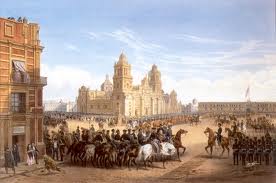 Americans In Mexico CityNote that the United States provocatively entered the disputed area. The size of the force was large enough to cause a response by the Mexican Army, yet small enough that their defeat was assured. This was of course the plan.
Americans In Mexico CityNote that the United States provocatively entered the disputed area. The size of the force was large enough to cause a response by the Mexican Army, yet small enough that their defeat was assured. This was of course the plan.
This was the false flag of the war. The superior party maneuvers the inferior into attacking. This led to the "self defense" of the country against the "aggressor." Well, we did need the land.
One of the things that amuses me is the selective use of the Bible to justify these kind of thefts. Yes, God did order the removal of the Canaanites from Palestine. But somehow I doubt that God was whispering in President Polk's ear. This was a war between one “Christian nation” and another.
Manifest destiny was opposed by the Whigs because it was felt that it would lead to the extension of slavery to the new territories. It seems likely that the expansion of slavery and the Mexican War led to the American Civil war. U.S. Grant, Civil War general and president, agreed.
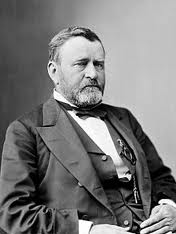 President GrantPresident Ulysses S. Grant, who as a young army lieutenant had served in Mexico under General Taylor, recalled in his Memoirs, published in 1885, that:
President GrantPresident Ulysses S. Grant, who as a young army lieutenant had served in Mexico under General Taylor, recalled in his Memoirs, published in 1885, that:
Generally, the officers of the army were indifferent whether the annexation was consummated or not; but not so all of them. For myself, I was bitterly opposed to the measure, and to this day regard the war, which resulted, as one of the most unjust ever waged by a stronger against a weaker nation. It was an instance of a republic following the bad example of European monarchies, in not considering justice in their desire to acquire additional territory.
Grant also expressed the view that the war against Mexico had brought punishment on the United States in the form of the American Civil War:
The Southern rebellion was largely the outgrowth of the Mexican war. Nations, like individuals, are punished for their transgressions. We got our punishment in the most sanguinary and expensive war of modern times."
Grant knew his Bible, as this echoes the book of James. Here is James 4, from the version The Message, where James tells us where war ultimately comes from.
1-2Where do you think all these appalling wars and quarrels come from? Do you think they just happen? Think again. They come about because you want your own way, and fight for it deep inside yourselves. You lust for what you don't have and are willing to kill to get it. You want what isn't yours and will risk violence to get your hands on it. 2-3You wouldn't think of just asking God for it, would you? And why not? Because you know you'd be asking for what you have no right to. You're spoiled children, each wanting your own way.
Words to consider as we probably head toward another war in the Middle East. Do we think that we will be immune from the inevitable consequences of the war? Many do think that—after all, we are Americans.
 Friday, March 9, 2012 at 6:01AM
Friday, March 9, 2012 at 6:01AM 
 War
War 
